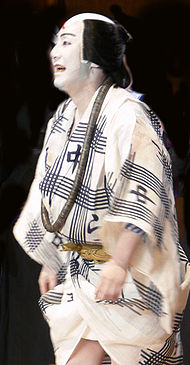 Many Japanese people must have been so surprised and felt deeply sad to hear about the death of NAKAMURA, Kanzaburo, one of the greatest Kabuki actors in Japan. I also felt so sad about it.
Many Japanese people must have been so surprised and felt deeply sad to hear about the death of NAKAMURA, Kanzaburo, one of the greatest Kabuki actors in Japan. I also felt so sad about it.
NAKAMURA, Kanzaburo was too young to be lost. He must have left many tasks undone. I just can’t help thinking how much he must have been feeling regretful for not being able to spend more time with his two sons and his grandson. Kanzaburo was mostly praised for his genius performance that he achieved through working his fingers to the bone days and nights. He also didn’t neglect his efforts to learn about Japanese classic literatures. Of all his efforts, I believe his best achievement was to have us experience the origin of Kabuki at Heisei Nakamura-Za which he established in Asakusa, the old town in Tokyo. This enabled us to have an idea that Kabuki is not only for the rich or some elder people.
I’ve been feeling that Kabuki performed at Kabuki-Za keeps in slow tempo that it makes the audience feel sleepy. In addition, Kabuki-Za has a break in-between which results in restraining the audience for a long time. For that reason, I could not help thinking but Kabuki is only for those who have ample time.
On the other hand, the performance at Heisei Nakamura-Za keeps in quick tempo, using contemporary languages. Thanks to it, I always enjoy all through the stories and understand the content well. I never knew until I visited Heisei Nakamura-Za that stories of Kabuki is full of developments and unexpected twists. I never felt the real pleasure of Kabuki is to watch the actors so close that I could even see their sweat. Being in the middle of enthusiasm, excitement, and laugh of the audience, I remember feeling as if I were with the people in Edo period.
Some commentators criticized that they deviated too much or they were even obscene. But Kanzaburo did not pay attention to such criticism; instead, he bravely focused on how they can entertain the audience more. He was always willing to upgrade their performance by costumes and stories that could draw us in.
Back in Edo period, the Kabuki theaters would work together for the first day of the performance by practicing hard, writing new stories, or preparing the best costumes with all the money and technique that they could use. Now I can easily imagine that the audience would cheer up the Kabuki actors with a shout, “Yo!” when the performance commenced. A star actor was so called because he would spend almost all the money on surprisingly brave costumes. I assume that Kanzaburo took a big risk in establishing the Heisei Nakamura-Za at the beginning in terms of a small budget for building a theater with a limited space for audience seats, which would not bring good business accounts.
His family lineage has a history of over 300 years. He must not cease to extinct. Meanwhile, he must brush up his performance of art maintaining the traditional custom. But at the same time, he must be brave enough to break through the traditions for better performance. And most of all, he must raise his own children into excellent, earnest, and gifted Kabuki actors for the next generations. This is what is expected the most, and I think this is the hardest task to accomplish.
As a mother of three children, I believe that there is nothing but child rearing that we will be required to make the hardest decisions. In order to train children, we need to be strict. So is to teach manners. If we are too strict, we may result in depriving their self-esteem. I know that many of my musician friends have siblings who have failed to be musicians, who became to hate music, or who even ended in hating their parents because of the exceedingly strict trainings that their parents forced in their childhood
So I wonder what kind of essence that Kanzaburo possessed to train his children this miracle, traditional performing art was.
I guess it was genuine trust and love that their father and mother had toward each other, and deep love that they had toward their children. To rear children to be strong enough to conquer the severe trainings, first of all, parents must be filled with love. Considering that, I truly think that Kanzaburo has a great family that the Japanese will refer to as ideal.
I sincerely hope that his two sons will overcome Kanzaburo’s death and make what Kanzaburo has achieved bigger and bigger.
